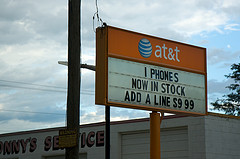 If you’re one of the many customers who would love to have an iPhone but don’t want to switch your carrier to AT&T Wireless in order to use one, then there may still be hope — albeit slim.
If you’re one of the many customers who would love to have an iPhone but don’t want to switch your carrier to AT&T Wireless in order to use one, then there may still be hope — albeit slim.
Last week in Washington D.C., FCC Acting Chairman Michael Copps spoke in front of the Pike & Fischer Broadband Policy Summit (read his full speech here). Copps labeled exclusive deals between handset manufacturers and cellular carriers as restrictive to innovation and creating an unfair market of competition. He called for an investigation into the matter.
Let’s face it. From a consumer standpoint, eliminating exclusive deals between handset providers and wireless carriers would be wonderful. Talk about opening up the field of choices for consumers! I’d certainly get an iPhone if I didn’t have to switch to AT&T Wireless!
But how would eliminating exclusivity affect the brands involved?
Some of the mystique around the iPhone would be lost. The “when you can’t have something, you want it more” mentality has certainly driven the buzz about the iPhone over the past couple of years. However, with more iPhones in more consumers’ hands, there is a much greater likelihood that they’ll like the product after trying it, try additional Apple products, and become loyal Apple customers. Apple is an incredibly strong relationship brands. Loyal Apple customers are vocal brand advocates who are always happy to tell other people how wonderful their Apple products are. There is great value in increasing the pool of Apple brand loyalists.
For AT&T Wireless, the story is a bit different. When customer contracts end, and now that wireless phone numbers can be carried with consumers from one network to another, leaving AT&T Wireless is a lot more attractive and much easier. A phone is only as good as the network it’s on. Therefore, if AT&T Wireless customers aren’t completely satisfied with their service from AT&T Wireless (and that includes customer service), then it won’t be difficult to make the decision to move to a different carrier and take their iPhones with them.
The real coup will come for other wireless carriers who to date have been excluded from offering the “it” product of the moment to their customers. I’m sure that many consumers have switched from their previous carriers to AT&T Wireless just so they could get an iPhone.
However, as much as limiting exclusivity is a good thing for consumers, I have to disagree with Copps’ argument that exclusivity reduces innovation. On the contrary, do you think that the Blackberry Storm and Palm Pre would have made it to market as quickly as they did had the iPhone not been such a success and stolen market share? And the one-up-manship continues! I don’t think that exclusivity hindered innovation at all in this case. With that said, I do think that exclusivity reduces consumer choice and keeps the playing field from being level.
What do you think? Can you think of any positives of exclusivity in the case of handheld manufacturers and wireless carriers?
Image: Flickr
Susan Gunelius is the author of 10 marketing, social media, branding, copywriting, and technology books, and she is President & CEO of KeySplash Creative, Inc., a marketing communications company. She also owns Women on Business, an award-wining blog for business women. She is a featured columnist for Entrepreneur.com and Forbes.com, and her marketing-related articles have appeared on websites such as MSNBC.com, BusinessWeek.com, TodayShow.com, and more.
She has over 20 years of experience in the marketing field having spent the first decade of her career directing marketing programs for some of the largest companies in the world, including divisions of AT&T and HSBC. Today, her clients include large and small companies around the world and household brands like Citigroup, Cox Communications, Intuit, and more. Susan is frequently interviewed about marketing and branding by television, radio, print, and online media organizations, and she speaks about these topics at events around the world. You can connect with her on Twitter, Facebook, LinkedIn, or Google+.